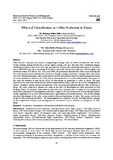Effects of Liberalization on Coffee Production in Kenya

View/
Date
2013Author
Okibo, Bichanga Walter
Mwangi, John Kabaka
Type
ArticleLanguage
enMetadata
Show full item recordAbstract
Coffee had for a long time been Kenya’s leading foreign exchange earner. In 1986 it accounted for 40% of total foreign exchange earnings but this was to be the highest earnings ever since after that coffee contribution dropped continuously to stand at only 3% in 2010. This was caused by a fall in coffee production from a peak of 128,700 m. tons in 1987/1988 crop year to an average of 49,088 m. tons in the last ten years with year 2010 recording a low production volume of 42,000 m. tons. Since early 1990s, the government liberalized the coffee sector believing that this would promote increased production and increase foreign exchange and farmers’ earnings. More than twenty years since liberalization began, coffee production has declined and remained depressed and this phenomenon forms the research problem in which we ask: Is this drop in coffee production as a result of liberalization? The purpose of this study was therefore to find out the effects of liberalization on production of coffee in Kenya. The main objectives of the study were to find out how, removal of government controls, take-over of societies’ management by farmers’ committees and the removal of monopolies in the processing and marketing affected coffee production in Kenya. The study conducted a detailed case study on the effect of liberalization on coffee production in New Weithaga Farmers’ Co-operative Union which was the main source of primary data. A sample of 12 was purposively drawn from a population of 18 management staff while a sample of 38 active farmers were selected through stratified random sampling out of an active Union membership of approximately two thousand farmers. The research findings were that Liberalization of the coffee sector resulted in decreased production of coffee. The reasons cited for the decline in coffee production included:- the mismanagement of co-operative societies; declining farmers’ earnings; decline in application of inputs; poor farming practices; and farmers’ loss of confidence in management of coffee affairs
URI
http://www.iiste.org/Journals/index.php/EJBM/article/view/4442http://erepository.uonbi.ac.ke:8080/xmlui/handle/123456789/42046
Citation
European Journal Of Business and Management Vol 5, No 3 (2013)Publisher
School of Education
Collections
- Faculty of Education (FEd) [1042]
